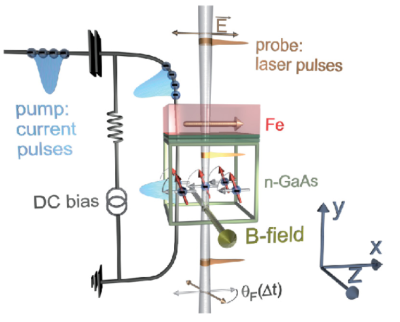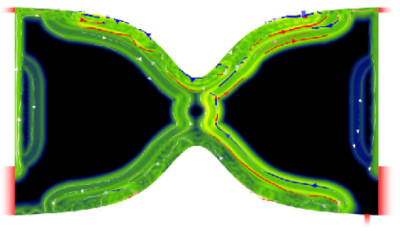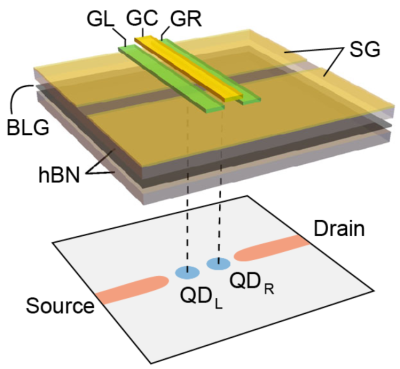Current events
Next talk tomorrow at 11:00 by Mrityunjay Pandey!
News 06.06.2025
New publication:Anisotropic supercurrent suppression and revivals in a graphene-based Josephson junction under in-plane magnetic fields
Site Content:
12.02.2022
New book chapter: "Überwachte Rollbewegung mit phyphox"

German only – Sebastian Staacks und Christoph Stampfer tragen mit einem Kapitel „Überwachte Rollbewegung mit phyphox“ zu dem neuen Buch „Für alles eine App - Ideen für Physik mit dem Smartphone“ von Thomas Wilhelm und Jochen Kuhn (Springer 2022) bei.

12.02.2022
Phyphox in the RWTH alumni magazine
We have contributed an article with a bit of project history to this term's RWTH alumni magazine.

15.12.2021
New publication: Probing Two-Electron Multiplets in Bilayer Graphene Quantum Dots

Phys. Rev. Lett. 127, 256802(2021) We report on finite bias spectroscopy measurements of the two-electron spectrum in a gate defined bilayer graphene (BLG) quantum dot for varying magnetic fields. The spin and valley degree of freedom in BLG give rise to multiplets of six orbital symmetric and ten orbital antisymmetric states. We find that orbital symmetric states are lower in energy and separated by ≈ 0.4–0.8 meV from orbital antisymmetric states. The symmetric multiplet exhibits an additional energy splitting of its six states of ≈ 0.15–0.5 meV due to lattice scale interactions. The experimental observations are supported by theoretical calculations, which allow to determine that intervalley scattering and “current-current” interaction constants are of the same magnitude in BLG.

03.12.2021
New publication: Triggering phase-coherent spin packets by pulsed electrical spin injection across an Fe/GaAs Schottky barrier

Phys. Rev. B 104, 195202 (2021) The precise control of spins in semiconductor spintronic devices requires electrical means to generate spin packets with a well-defined initial phase. We demonstrate a pulsed electrical scheme that triggers the spin ensemble phase in a similar way as circularly polarized optical pulses generate phase coherent spin packets. Here, we use fast current pulses to initialize phase coherent spin packets, which are injected across an Fe/GaAs Schottky barrier into n-GaAs. By means of time-resolved Faraday rotation, we demonstrate phase coherence by the observation of multiple Larmor precession cycles for current pulse widths down to 500 ps at 17 K. We show that the current pulses are broadened by the charging and discharging time of the Schottky barrier. At high frequencies, the observable spin coherence is limited only by the finite bandwidth of the current pulses, which is of the order of 2 GHz. These results therefore demonstrate that all-electrical injection and phase control of electron spin packets at microwave frequencies is possible in metallic-ferromagnet–semiconductor heterostructures.

15.11.2021
New publication: Contacts and upstream modes explain the electron-hole asymmetry in the graphene quantum Hall regime

Phys. Rev. B 104, L201406 (2021) Observations of electron-hole asymmetry in transport through graphene devices at high magnetic field challenge prevalent models of the graphene quantum Hall effect. Here we study this asymmetry both in conventional magnetotransport and in scanning gate microscopy maps measured in an encapsulated graphene constriction. We reveal that the presence of upstream modes and local doping in the vicinity of electrical contacts leads to a totally different picture of topological breakdown for electrons and holes, explaining the observed asymmetry.

27.10.2021
Christoph Stampfer becomes spokesperson of the physics department
Christoph Stampfer was elected as spokesperson of the Physics Departement ("Fachgruppensprecher") for the next two years.

14.10.2021
International standard for measuring the flatness of graphene has been published
Jointly with the Standardization Commission of the Graphene Flagship our institute (big thanks to Christoph Neumann and Jens Sonntag) have pushed through a new IEC standard for assessing the strain uniformity of single-layer graphene using Raman spectroscopy. For more details see: IEC TS 62607-6-6 “Nanomanufacturing – Key control characteristics – Part 6-6: Graphene – Strain uniformity: Raman spectroscopy” https://webstore.iec.ch/publication/34162.

02.09.2021
New publication: Spin-valley coupling in single-electron bilayer graphene quantum dots

Nat. Commun. 12, 5250(2021) Understanding how the electron spin is coupled to orbital degrees of freedom, such as a valley degree of freedom in solid-state systems, is central to applications in spin-based electronics and quantum computation. Recent developments in the preparation of electrostatically-confined quantum dots in gapped bilayer graphene (BLG) enable to study the low-energy single-electron spectra in BLG quantum dots, which is crucial for potential spin and spin-valley qubit operations. Here, we present the observation of the spin-valley coupling in bilayer graphene quantum dots in the single-electron regime. By making use of highly-tunable double quantum dot devices we achieve an energy resolution allowing us to resolve the lifting of the fourfold spin and valley degeneracy by a Kane-Mele type spin-orbit coupling of ≈ 60 μeV. Furthermore, we find an upper limit of a potentially disorder-induced mixing of the K and K′ states below 20 μeV.

